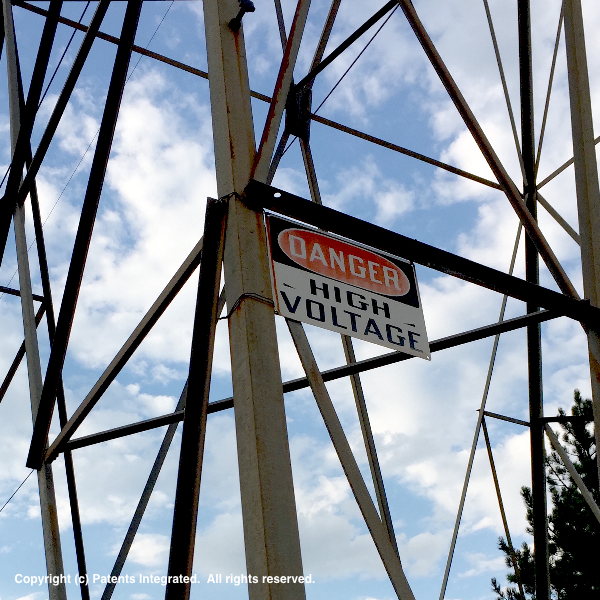This article is part of the “What Should I Do (WSID)?” series where I discuss various scenarios involving intellectual property and business. Topic suggestions are always welcome.
“I think Company X is infringing on my patent. What should I do?”

Whoa, easy there. Them’s fighting words. “Infringing” is not a word to be thrown about lightly, whether you are talking about your own patent or someone else’s IP. In fact, using the “I” word in the wrong context can have unintended consequences.
I know it’s easy to get worked up when you think someone might be generating big profits while ignoring your rights as a patent owner. However, whenever someone mentions the word “infringement” in the patent world, people’s hackles go up because of recent bad press. Unless you’ve been hiding under a rock (or a bridge?) in the past few years, you’ve probably seen a bunch of news about the evils promulgated by “Patent Trolls” who have the audacity to accuse and sue companies for infringement of their patents. If you believe all of the headlines, patent trolls are responsible for everything from the economic recession to global warming. In recent years, there have been legislative efforts to curb the activities of Patent Trolls.
While I’m not condoning or condemning the business of patent assertion and IP enforcement, depending on how you proceed with the possible infringement, you too might get lumped with the evil Patent Trolls of this world. That may or may not be advantageous for your business.
So then, how should you proceed when your righteous anger and sense of injustice starts to rear its ugly head?
Here are four factors to consider before you start sending nasty-grams to your competitors.
- Know your risks
Patent licensing and enforcement is a high risk endeavor. There are many ways in which the odds can be stacked against the patent owner, including the “anti-Patent Troll” regulations I’d mentioned above. Here are some questions you can ask yourself before considering the next steps:1. Do you have any experience with a patent licensing/enforcement campaign, either as the licensor or licensee?2. Are you familiar with the legal nuances of patent enforcement?
3. Have you previously been involved with IP litigation?
4. Do you own the patent as an individual or as a company?
5. What sort of resources (financial, expertise, time) do you have available to pursue this endeavor?
6. Do you currently, or have you in the past, made a product based on your patent? If so, how successful has the product been in the market place? And have you marked your product with the appropriate markings (e.g., “Patent Pending” or the patent number)?
7. Have you published any articles or videos about your patent (or the product related thereto)?
8. Has any one previously approached you about taking a license or acquiring the rights to your technology?
These are just some of the more general considerations, in addition to the more detailed questions below, that would go into assessing the pros and cons of pursuing a patent licensing/assertion campaign. Discussing your situation with an IP professional well versed in both patent prosecution and litigation would be essential.
- Know your patent
In a patent enforcement scenario, you’ll probably need to look at your patent in a very different way from when you were trying to get the patent in the first place. When you were working with your patent counsel to write and prosecute your patent application, your counsel probably urged you to come up with the broadest claims that can be supported by your application, to brainstorm on ways to cover as many of your competitors’ products and possible future improvements as possible. You need to modify that thinking when you are looking at your patent from a patent assertion perspective.When you are trying to evaluate patent claims for infringement analysis, the more specific the support the better. Your argument will be pretty good if you can show, component by component, how the competitor product includes every single element of one of your patent claims. You can further strengthen your argument by showing how each element in your patent claim is supported in your patent specification by text and figures.Now, the specification support for claims is similar to the tact you would take in trying to convince a patent examiner to allow your patent claims. One major difference between arguing with the USPTO over the claims in a pending patent application versus looking at the claims from an enforcement perspective is that the interpretation of the claims is done by the courts using guidelines that have been developed through years of case law. Here’s a primer (albeit a bit dated) from a respected law firm about how patent litigators look at claims. That’s just the basics, and the analysis of specific cases are generally much more complicated.
If you had an experienced IP professional guiding your patent strategy, you’d probably already started thinking about your claims, anticipating future offensive patent strategies. If not, you may run into the problem that the claims in your patent are not as strong as you thought they were.
- Know your competitor’s product
While buying and taking apart your competitor’s product to try to reverse engineer it would not be necessary at this point, you can still find out what public information is available about the product. For example, there may be marketing literature or promo videos available online. Some companies post details of any patents related to that product, especially in the high tech space. You might also be able to get information about the technology behind the product through publication databases or press releases.One note of caution here. If you do start digging through publications, such as journal articles or patent publications, keep good notes of the search terms you used as well as the search results. Especially if you are seeking additional patent protection on your innovation, such documents could fall within the scope of your own Duty of Disclosure in your patent prosecution efforts. Be sure to alert your patent prosecution counsel, if that is the case.In any case, do NOT write down anywhere (hard copy notes, email, electronic file, or otherwise) your own reactions to the references you find. Resist the urge to email or text your cofounder, “OMG, this patent I just found is EXACTLY like our product.” Such documents can become discoverable, if you get into a legal scuffle. That rule of thumb about not writing anything that you wouldn’t want to see on the headline of the New York Times or have your mom read? That definitely applies here, and then some.
Eventually, if you decide to move forward with the patent licensing/assertion campaign, then all of this information will be used by future counsel to analyze the case and its likelihood of success. If you’re not comfortable with the legal ramifications of such search efforts, find an IP professional to help you.
- Know your industry
Some industries are much more litigious than others. Manufacturers of high tech consumer products tend to be more patent savvy than, say, commodities businesses. For example, the ongoing feud between Apple and Samsung as well as companies like Blackberry brandishing their IP portfolios has sensitized the mobile device industry to the business need to strategically view their own and others’ intellectual property.Also, some industries are a LOT more capital intensive than others. For example, any activity in biotech, including R&D, manufacturing, partnering, and licensing, is much more expensive to do than in an industry with a lower barrier to entry, such as software and apps. Biotech companies have a lot more at stake than other companies with lower overhead, so they’ll certainly fight harder against unsolicited licensing approaches.Additionally, some industries are rife with patent assertion activities. You can find out how your own industry stacks up in terms of patent litigation by looking at resources like the litigation search engine at RPX or license agreement databases like Onecle. The more activity you find in these areas, the more skilled the person sitting across the table from you will be in future negotiations. That will give you an idea of how prepared you will need to be before entering into any discussions.
I can’t stress enough how crucial it will be for you to good expert advice, especially if you are new to the business of patent assertion. You wouldn’t go messing with high voltage wires without the appropriate protective gear and training, right?
The person who helped you obtain your patent may or may not be the appropriate expert, as he/she may not have the experience in patent assertion or negotiation. You’ll really need the advice of someone who can give you an objective evaluation of your patent, as well as analyze the chances of success of a patent assertion campaign based on the strength of your patent, your appetite for risk, the ease of proving your case, the potential licensees, the IP landscape of your specific technology, the trends in your industry, and, of course, the latest case law. Like any other activity involving intellectual property, be sure to understand your risks, and proceed with caution.
“May the odds be ever in your favor.” — Suzanne Collins, Hunger Games
About the Author and Disclaimer: Yoriko Morita has worked with innovators in a variety of contexts, in a law firm working for inventors, as in-house IP director, and as a licensing professional. She currently helps clients with such IP-related questions, as well as developing integrated business/technology/patent strategies, through her company, Patents Integrated. The contents of this article are intended to be informational only, not legal advice. The reading of this article does not establish an agent-client privilege between you and Patents Integrated, and Patents Integrated is not responsible for any damages arising from your use of the information in this article under any circumstance. Your use of the information in this article is at your own risk, and you should seek the advice of a licensed legal professional regarding your own specific situation.

